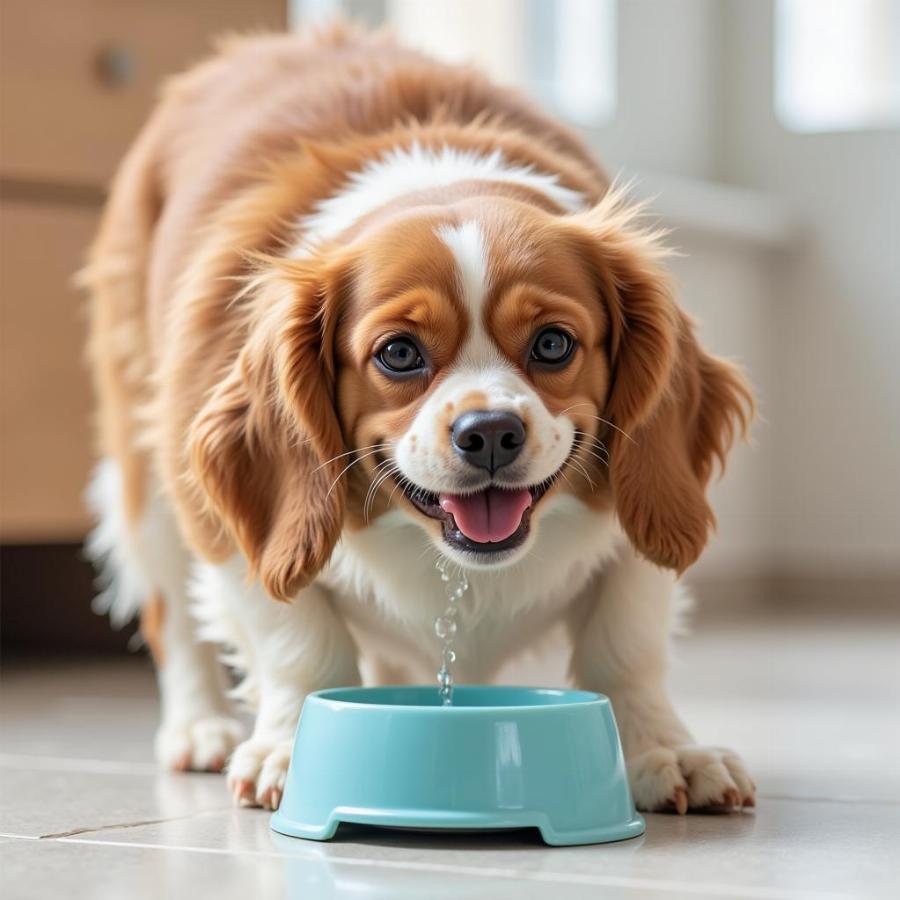Is your furry friend struggling to pass stool despite their best efforts? Seeing your dog strain to poop with no success can be distressing for both you and your pet. This inability to defecate, known medically as constipation, can be caused by a variety of factors. This article will discuss the common reasons why your dog keeps trying to poop but nothing comes out, explore potential solutions, and guide you on when to seek veterinary help.
Understanding Canine Constipation: Why is My Dog Having Trouble Pooping?
There are many reasons why your canine companion might be experiencing difficulty defecating. Some common causes include:
- Dietary Issues: A diet low in fiber is a frequent culprit behind constipation. Fiber adds bulk to the stool, making it easier to pass.
- Dehydration: Just like in humans, lack of sufficient water intake can lead to hard, dry stools that are difficult to pass.
- Lack of Exercise: Regular physical activity helps stimulate the digestive system. A sedentary lifestyle can contribute to slower bowel movements.
- Obstruction: This can be a serious cause of constipation. Swallowing foreign objects like toys, bones, or fabric can create a blockage in the digestive tract. Ingesting things like hair (especially in long-haired breeds) can also form obstructions.
- Medications: Certain medications, such as antihistamines or some pain relievers, can cause constipation as a side effect.
- Medical Conditions: Underlying health issues like kidney disease, hypothyroidism, or neurological disorders can also lead to constipation.
- Stress or Environmental Changes: Just like humans, dogs can experience digestive upset due to stress, anxiety, or changes in their environment.
Recognizing the Signs: Is My Dog Constipated?
Beyond straining to defecate, there are other telling signs that your dog may be constipated:
- Infrequent bowel movements: If your dog is going less than once a day, or hasn’t pooped in over two days, it could be a sign of constipation.
- Hard, dry stools: Constipated dogs often produce small, pebble-like feces that are difficult to pass.
- Painful defecation: Your dog may whine, cry, or assume an unusual posture while trying to defecate.
- Blood in the stool or straining: While small amounts of blood can indicate straining, larger quantities could point towards a more serious issue.
- Loss of appetite, vomiting, or lethargy: These symptoms might indicate a more serious underlying problem and warrant immediate veterinary attention.
Helping Your Dog Poop: Home Remedies and When to See the Vet
If you suspect your dog is constipated, it’s essential to consult your veterinarian to rule out any serious underlying medical conditions. Once a serious condition has been ruled out, there are several things you can do at home to help:
1. Increase Water Intake: Ensure your dog has access to fresh, clean water at all times.
2. Dietary Adjustments:
- Add Fiber: Pumpkin puree (plain, not pie filling), canned pumpkin, or cooked sweet potato are great sources of fiber. Gradually introduce these into your dog’s diet.
- Consider a Wet Food Diet: Wet food has a higher moisture content than dry kibble and can help with hydration and stool softening.
3. Encourage Exercise: Regular walks and playtime can stimulate bowel movements.
4. Probiotics: Probiotics can help regulate gut health and may aid in relieving constipation.
5. Hairball Remedies: If you have a long-haired breed, consider using a hairball remedy or adding a teaspoon of petroleum jelly to their food to help move ingested hair through the digestive system.
When to Seek Veterinary Care
While home remedies can be helpful, it’s crucial to contact your veterinarian if:
- Your dog’s constipation lasts for more than two days.
- Your dog exhibits other symptoms like vomiting, lethargy, or loss of appetite.
- You suspect your dog has ingested a foreign object.
- You notice a significant amount of blood in their stool.
Your veterinarian can determine the underlying cause of the constipation and recommend the most appropriate treatment plan, which may include:
- Enemas: Administered by a veterinarian, enemas can help soften and evacuate impacted stool.
- Medications: Your vet may prescribe stool softeners, laxatives, or medications to address any underlying medical conditions.
- Surgery: In severe cases where an obstruction is present, surgical intervention may be necessary.
Preventing Future Episodes: Keeping Your Dog Regular
Preventing constipation is key to your dog’s overall health and well-being. Here are some tips to keep your furry friend’s bowels moving smoothly:
- Feed a High-Quality Diet: Choose a diet that is specifically formulated for your dog’s age, breed, and activity level. Ensure it contains an adequate amount of fiber.
- Ensure Adequate Hydration: Always provide access to fresh water, encouraging your dog to drink regularly.
- Maintain a Regular Exercise Routine: Daily walks and playtime are not only beneficial for your dog’s physical health but also their digestive health.
- Regular Veterinary Checkups: Regular vet visits can help identify and address any potential health issues early on.
 Dog Drinking Water
Dog Drinking Water
Beaut Dogs: Your Partner in Pet Care
Beaut Dogs is your trusted resource for all things dog-related. We provide reliable and insightful information to help you provide the best care for your canine companion. If you have any concerns about your dog’s health or need further advice, please don’t hesitate to reach out to us. Email: [email protected] for personalized guidance from our team of pet experts.